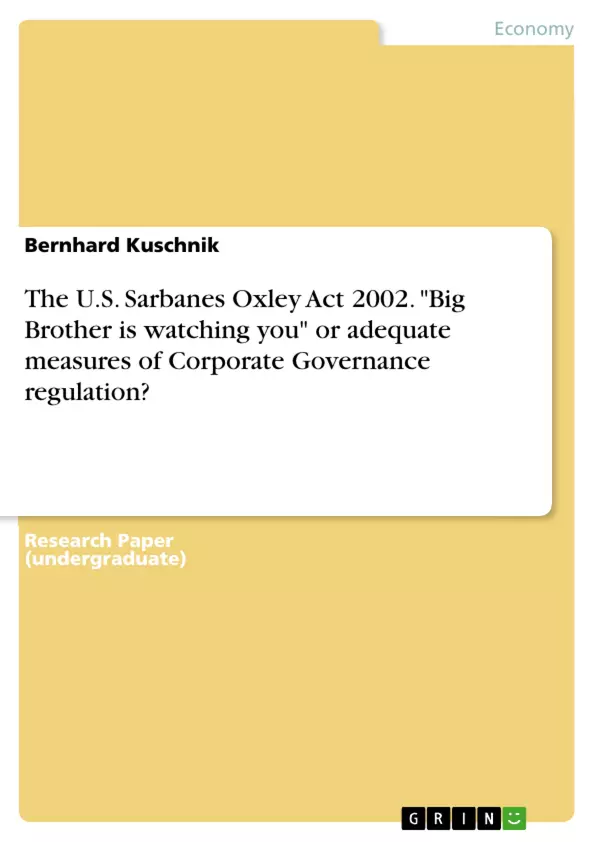Corporate Governance has become one of the hottest fields of international company law and economics. Whereas many European countries have chosen self regulatory market based approaches or favour comply or explain provisions, the U.S. government decided to take mandatory legislative actions in the aftermath of various accounting and corporate governance scandals, headed up by Enron and WorldCom. This article explains why most, if not all of the relevant provisions regarding corporate governance, are ill conceived and thus should be withdrawn the sooner the better to prevent future economic harm. The author concludes with an evaluation and an outlook for alternatives.
Abschlussarbeit im Kurs Corporate Governance im Rahmen des LL.M. Studienganges Internationales Wirtschaftsrecht an der Universität Aberdeen, Schottland
Inhaltsverzeichnis (Table of Contents)
- A. Introduction
- B. Incidents which lead to the enactment of SOX
- C. SOX Corporate Governance Provisions
- I. “Inside” disclosure and monitoring provisions
- a. Sec. 301 SOX - Public Company Audit Committees
- b. Sec. 302 and 906 (a) SOX - Corporate Responsibility for Financial Reports
Zielsetzung und Themenschwerpunkte (Objectives and Key Themes)
This article aims to analyze the Sarbanes-Oxley Act 2002 (SOX) and evaluate its impact on corporate governance in the United States. The article argues that many provisions of SOX are ill-conceived and should be withdrawn to prevent future economic harm.- The role of market forces in corporate governance
- The impact of the Enron and WorldCom scandals on corporate governance regulation
- The effectiveness of SOX in preventing accounting fraud and improving corporate governance
- The potential consequences of SOX on corporate performance and efficiency
- Alternatives to SOX for improving corporate governance
Zusammenfassung der Kapitel (Chapter Summaries)
- A. Introduction: This chapter introduces the Sarbanes-Oxley Act 2002 (SOX) and its significance as a landmark legislation in U.S. corporate governance. It highlights the shift from market-based regulation to government-driven regulation and discusses the rationale behind SOX, emphasizing the protection of small investors.
- B. Incidents which lead to the enactment of SOX: This chapter examines the series of accounting and bankruptcy scandals that led to the enactment of SOX, including Enron and WorldCom. It analyzes the factors that contributed to these scandals, such as the bull market of the 1990s, the focus on growth over financial transparency, and the role of investment banking firms.
- C. SOX Corporate Governance Provisions: This chapter delves into the specific corporate governance provisions introduced by SOX, focusing on "disclosure as the cure" for accounting fraud. It examines the role of monitoring and punishment, particularly the establishment of independent audit committees and the increased responsibilities of CEOs and CFOs in certifying financial statements.
- I. “Inside” disclosure and monitoring provisions: This section focuses on internal controls and monitoring within companies. It analyzes the impact of SOX on the roles and responsibilities of officers, directors, and employees, highlighting the importance of audit committees, whistleblower protection, and corporate responsibility for financial reports.
- a. Sec. 301 SOX - Public Company Audit Committees: This section examines the requirement for independent audit committees composed solely of "outsiders," analyzing its potential benefits and drawbacks in terms of effectiveness, shareholder rights, and the diversity of expertise.
- b. Sec. 302 and 906 (a) SOX - Corporate Responsibility for Financial Reports: This section discusses the increased responsibilities of CEOs and CFOs under SOX, including their obligation to certify financial reports and the consequences of non-compliance. It examines the potential impact of these provisions on corporate decision-making and accountability.
Schlüsselwörter (Keywords)
The article focuses on the following key terms: corporate governance, Sarbanes-Oxley Act 2002, accounting fraud, market regulation, government regulation, investor protection, audit committees, financial reporting, CEO and CFO responsibility, and corporate accountability.Frequently Asked Questions
What is the Sarbanes-Oxley Act of 2002 (SOX)?
SOX is a U.S. federal law that established sweeping auditing and financial regulations for public companies to protect investors from fraudulent accounting activities.
What triggered the enactment of SOX?
The act was a response to major corporate and accounting scandals, including those affecting Enron and WorldCom, which cost investors billions of dollars.
What are the main corporate governance provisions of SOX?
Key provisions include the requirement for independent audit committees (Sec. 301) and the personal certification of financial reports by CEOs and CFOs (Sec. 302).
Why is SOX criticized by some legal scholars?
Critics argue that many provisions are ill-conceived, impose high compliance costs, and move away from efficient market-based self-regulation toward mandatory government intervention.
How does SOX protect whistleblowers?
SOX includes provisions that protect employees of publicly traded companies who provide evidence of fraud, shielding them from retaliation by their employers.
- Quote paper
- Bernhard Kuschnik (Author), 2005, The U.S. Sarbanes Oxley Act 2002. "Big Brother is watching you" or adequate measures of Corporate Governance regulation? , Munich, GRIN Verlag, https://www.grin.com/document/186138



